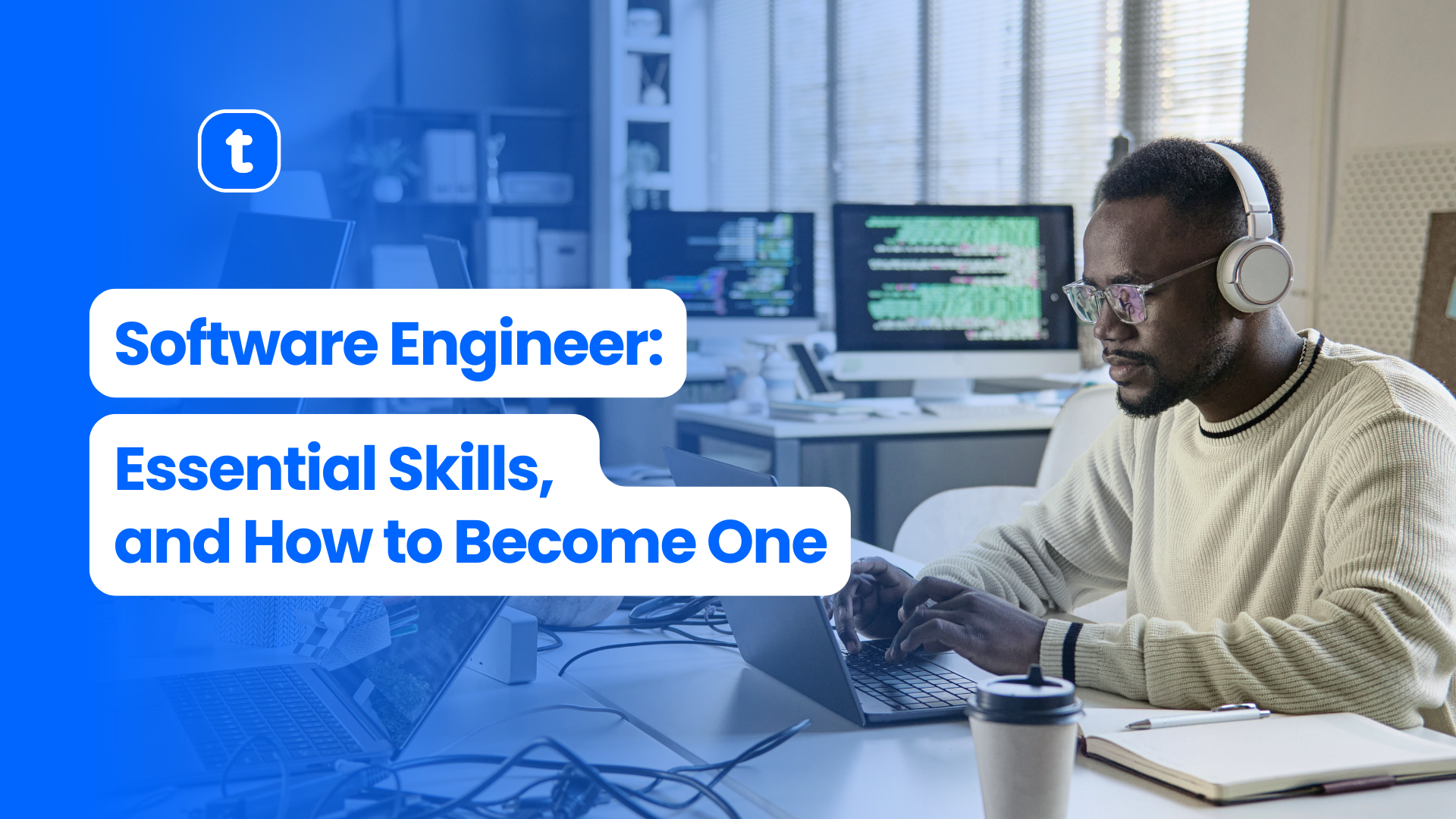As of 2025, the average software engineer earns approximately $123,052, with senior engineers earning around $200,000 annually. Software engineering is one of the most in-demand skills today because technology drives the world, and software engineers make it happen.
According to the U.S. Bureau of Labor Statistics (BLS), overall employment of software developers, quality assurance analysts, and testers is projected to grow 17 percent from 2023 to 2033, much faster than the average for all occupations.
In this article, we will cover the following:
- What is software engineering, and what do software engineers do?
- How to become a software engineer
- Get an education
- Master programming languages & required skills
- Learn data structures and algorithms
- Join coding bootcamps
- Choose an area of specialization
- Get practical experience
- Get certifications & advanced learning
- Land your first job as a software engineer
- Essential and soft skills every software engineer needs
What is Software Engineering, and What do Software Engineers do?
Software engineering is the process of designing, building, and maintaining application software, websites, and complex systems. It’s more than just coding—it’s about solving real-world problems with technology, while ensuring efficiency, reliability, and scalability.
Software engineers design, build, and maintain software such as games, business applications, operating systems, network control systems, etc.
How to Become a Software Engineer
Here are sure things you need to do to get your career started as a software engineer:
1. Get a Bachelor’s Degree in Computer Science (CS)
To start your career in software engineering, you need to have a degree in Computer Science. Most recruiters prefer that you already have a degree to back up your skills.
The benefits of getting a degree in Computer Science are that it offers you a strong background in learning about software and designs, equips you with coding skills, increases your job prospects, and while studying computer science, you can delve into getting relevant skills and volunteering for real-life projects.
It will be easy to convince people you are a software engineer with that degree; however, without the degree, you can still learn the relevant skills and make headway in your career.
N/B: You can become a successful software engineer without a degree by focusing on self-learning, gaining practical experience, and earning certifications.
Many successful software engineers have built their careers by learning programming languages through bootcamps, online courses, and working on projects.
The key is to develop the right skills, build a strong portfolio, and demonstrate your abilities to potential employers.
2. Master Programming Languages & Required Skills
Most of the jobs you will do as a software engineer will require you to know programming language such as Python, Java, C++, C#, and other relevant programming languages.
Understanding of basic logic such as Boolean, operating systems, algebra, code debugging, are all relevant skills you need to master as a software engineer.
3. Learn Data Structures and Algorithms
Data can be stored in different structures but you need to know how to tweak and manipulate these structures to create software.
Learning these skills will help you write codes that are efficient thereby improving your programming abilities which will be needed to make headways as a software engineer.
4. Take Software Engineering Courses Online
In addition to getting a degree, you need to take professional software engineering courses online.
Coursera, Udemy, W3Schools, Data Camp, and even YouTube offer solid software engineering courses to help you learn and sharpen the skills you need as a software engineer.
5. Join Coding Bootcamps
Bootcamps are short and intensive training techies get into. Bootcamps help you practice your skills, learn more and deepen your knowledge, and connect with other people in the same field as you.
Bootcamps are different from courses because courses are flexible but bootcamps are very intensive training.
Some bootcamps you can join include; General Assembly, SpringBoard, DevMountain, Coding Bootcamp, and other relevant boot camps offered globally.
Bootcamps offer you many benefits such as:
- Intensive training.
- Hands-on practical sessions.
- Access to relevant tools needed to sharpen your skills.
- Participate in group sessions and presentations.
- Network with fellow software engineers both junior level and senior level engineers.
- Offers you coaching sessions.
Also, engaging in Boot camps equips you with the discipline you need to learn than if you are self learning. And, the learning period will be faster than if you were learning all by yourself.
Bootcamps will give you an edge, and as a budding software engineer, investing in boot camps will help your career growth.
6. Choose an Area of Specialization
As discussed earlier, there are different fields of specialization you can take on as a budding software engineer, and each area is very important in the grand scheme of things.
You need to pick one that aligns with your interest, get the skills and knowledge required, and start bidding for jobs.
Some of the most in-demand areas include:
- Cloud engineering
- Full-stack development
- Data engineering
- Cybersecurity
- Machine learning and AI
7. Get Practical Experience
It does not just end with getting a degree or taking multiple courses; You also need practical experience.
This can be obtained by working on real life projects or even personal projects. When starting out, you can volunteer or intern for free.
The goal is to gain experience and learn while doing the job in real life scenarios. While starting out, money should not be the main focus but focus on getting the relevant skills and experience.
You can also freelance by bidding for jobs on LinkedIn, Upwork, Fiverr, Indeed, Working nomads, and many other job platforms where you can freelance from.
8. Get Certifications & Advanced Learning
As they say, learning never ends. You need to continue updating your knowledge in your chosen field.
You should not relent in upskilling and taking advanced courses in order to scale up in your field as a Software Engineer. Also, getting a certification is important; as it will enhance you skills and increase your job prospects.
Some of the best certifications for software engineers include:
- Microsoft Certified: Azure Developer Associate
- AWS Certified Solutions Architect
- Certified Kubernetes Administrator
- Google Cloud Professional Cloud Developer
- Certified ScrumMaster (CSM)
- Oracle Certified Java Programmer
9. Land your first job as a Software Engineer
In order to land your first job as a Software Engineer, you need to be prepared. You have to prepare your resume, portfolio, as well as a cover letter. In addition, you need to prepare yourself for interviews.
1. Prepare you Resume
A piece of document (1-2pages), summarizing your professional qualifications.
Your resume should highlight your educational background, skills, work experience, or projects you have worked on in the course of your career.
Keep a Resume handy when applying for a job, and always remember to tweak your resume to fit each job you are applying for.
2. Get a Portfolio
A Portfolio is a collection of projects you have worked on. While your resume says you have done something, a Portfolio shows what you have done, how you did it, and what was the results of what you did.
A potential employer needs to see concrete example of what you can do beyond what you say in your resume. Your portfolio should consist of samples of your work, it is a practical way to show your skills to a potential employer.
3. Apply for a Software Engineer Job
Next thing you want to do when searching for a job is get on LinkedIn, one of the social networks where you can connect with potential employers and pitch yourself to them.
4. Master the Art of Nailing Interviews
One way to do this is to see interviews as a way to pitch yourself to potential employers.
You will be asked questions about your skillsets and experience, you must be ready to defend your skills and tell the interview how your skills and experience aligns with their interest.
Remember to stay confident while selling yourself; employers love to see confidence.
Essential Skills Every Software Engineer Needs
As a software engineer you need both technical and soft skills, technical skills include:
- Knowledge of programming language like JavaScript, Python, C++, C#, etc.
- Knowledge of different Operating Systems.
- Knowledge of Data structures and Algorithms.
- SQL
- Database Administration
- Debugging
- Software Frameworks
- Encryption.
Soft Skills Every Software Engineer Needs
Not just technical skills, but soft skills are also required to excel in a software engineering career, skills such as:
- Problem solving
- Creativity
- Quick Learner
- Time management
- Communication
- Team Player
- Adaptability
- Self Motivation.
FAQs on How to Become a Software Engineer
How Long Does It Take to Become a Software Engineer?
Becoming a software engineer can take months to years to rise from an intern level to a senior level software engineer.
One things that can fasten the process for you is engaging in bootcamps, volunteering on real-life projects, basically gaining the required experience, which will help you learn more and fasten your way up the ladder.
Can I Become a Software Engineer without a Degree?
Yes. While a degree is not compulsory, it gives you a head start and increases your prospects. With a degree, you already have basic knowledge of the required skills.
However, you can still be a software engineer without a degree. You just have to keep upskilling and gaining certifications that can set you out in the field.
Is Software Engineering Hard to Learn?
Software engineering requires you to have knowledge of technical skills, knowledge of mathematics, and statistics. If you are quick to understand and grasp mathematical and technical concepts, then it will be a soft ball.
How much do software engineers earn?
An average software engineer earns $100 annually. Senior engineers earn as much as $200 annually.
Which Programming Language Should I Start With?
Python is the best choice for absolute beginners, but JavaScript is great if you’re more interested in web development.




